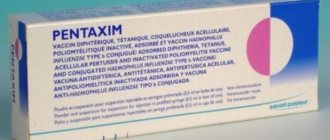What else are there vaccinations for?
Vaccinations exist for many diseases, but in our country the most relevant are the following.
Flu
Getting a flu vaccine every year reduces your chances of getting it. Many people think that this vaccine is useless because the virus mutates quickly. But everything is much more complicated. In this arms race, there are special forecasting tools with which you can quite accurately predict the structure of the virus in the new season and create a new, relevant vaccine every year.
Whooping cough
Vaccination against whooping cough for adults in our country, and in the world, became available not so long ago. Previously, it was believed that adults do not get whooping cough, only children. But it turned out that this was not the case. It’s just that in adults it often occurs in a mild form, and no diagnosis is made. Such a person can be a source of infection for others, for example, for his own newborn child. We received our last whooping cough vaccine when we were about one and a half years old, and in adulthood we no longer have immunity to this infection. In certain life situations, which will be discussed below, vaccination may be justified. Vaccination against whooping cough is not included in the national calendar; the Adasel vaccine is the only vaccine for adults available in the Russian Federation, and only at its own expense.
Chicken pox
If you have not had chickenpox, it is better to get vaccinated. Ten years ago there was no way to protect against this infection in Russia, since there was no such vaccine in the country; it is relatively new. We also do not carry out mass vaccination of children against this infection, so the chance of encountering it, especially if you have children, is very, very high. In adults, chickenpox is more severe than in children, so there is a chance to reduce your risk of getting sick to almost zero.
Hepatitis A
The hepatitis A vaccination is included in the calendar for epidemic reasons, which means that not everyone gets it. But any adult can do it if they wish, since jaundice is also not very pleasant. This vaccine is especially indicated for some people. Those who have an occupational risk of infection are subject to vaccination:
- medical workers;
- public service workers;
- employed at food industry enterprises;
- workers maintaining water supply and sewerage facilities, equipment and networks.
Also at increased risk of infection are:
- military personnel traveling to areas with high incidence rates;
- employees of educational institutions;
- staff involved in patient care.
If someone in your family falls into these groups, the risk for the rest of the family also increases, and it would be wise to get vaccinated.
Tick-borne encephalitis
This is a viral infection transmitted by ticks. Widely distributed in Russia, Europe and the USA, but not everywhere. If you permanently live in an endemic area, then vaccination can protect you. There is no cure for this disease, and the consequences can be very dire, so it depends on your luck.
We have never heard of many vaccines, such as against plague, dysentery, typhus and others, since they are not typical for our region, but can be useful when traveling abroad.
A number of other vaccines, such as vaccinations against pneumococcal, meningococcal, and Haemophilus influenzae infections, are important for certain groups of people at increased risk and are not recommended for mass vaccination.
I am a student
Young adults, especially those living in close quarters (dormitories or barracks), should be vaccinated according to age according to the national calendar. And also annually undergo seasonal vaccination against influenza and revaccination against tick-borne encephalitis if they live in an endemic area.
In addition to the calendar, you can vaccinate against the following list of diseases:
- whooping cough (even if you were vaccinated as a child or were ill, especially if you missed a revaccination against diphtheria and tetanus at age 14);
- HPV (if not vaccinated as a teenager);
- chicken pox and hepatitis A, if you have not been sick and are not vaccinated.
- Particular attention should be paid to meningococcal infection. Due to lifestyle changes, teenagers and young adults have an increased risk of encountering this extremely nasty bacteria. They can also become a source of it for younger siblings and older relatives who are vulnerable to it.
What vaccinations should adults be given and how to combine them?
Various infections, such as measles, tetanus and others, have not disappeared anywhere - they still exist next to us and require preventive protection. As experts note, vaccinations remain the best means of preventing such infections. By the way, everyone has already become accustomed to them - vaccination against most infections is included in the national calendar. But at the same time, there is often an opinion that the national calendar is about children. In fact, adults also have their own specific immunization rules. Which ones - says Rospotrebnadzor.
The first thing the department reminds us is that the specific immunity acquired in childhood during a course of vaccination weakens over the years. This means that it is worth considering the issues of revaccination. “Every adult needs a booster vaccination against tetanus and diphtheria every 10 years,” the department said in a statement.
Five more vaccinations. How will the National Vaccination Calendar change? More details
Don't forget about the threat of hepatitis B. It causes serious pathologies such as liver cirrhosis and cancer. But “children’s” pathologies - measles, rubella, pneumococcus - cause brain damage, pneumonia, etc. And death is possible. “If you don’t know when you were vaccinated against measles, rubella, mumps, hepatitis B, be sure to get vaccinated,” it is written on the Rospotrebnadzor website.
Vaccination against pneumococcus is recommended for those who are often sick. This bacterium is considered part of the normal flora in half of people, but under favorable conditions it can lead to negative consequences, for example, complications in the form of sinusitis and others.
The agency advises those who travel frequently, have a wide range of social contacts, and eat street fast food to get vaccinated against meningococcal infection, as well as hepatitis A. It is worth considering that you can become infected with such infections in prosperous countries with a high standard of living.
In addition, before traveling, you should find out about the potential risks of contracting various infections in the region of your presence, for example, in exotic countries - yellow fever. But this is not the only danger. Even when traveling around Russia, for example, to areas where tick-borne encephalitis is endemic, you can get the disease, so you should also worry about vaccine prevention in advance.
What vaccinations do adults and children need? Vaccination calendar Read more
Rospotrebnadzor recommends paying special attention to the prevention of chickenpox, or chickenpox. This is especially true for adults, since childhood infections are more severe for them. The consequences of chickenpox in adults can be viral pneumonia, chickenpox encephalitis and joint diseases. “In adults, childhood infections are much more severe, are more often accompanied by complications and can lead to death,” the department said in a statement.
So you should consult a doctor, draw up a vaccination plan with him, and, if necessary, get tested for the presence of antibodies to certain infections, after which you can start strengthening your immunity.
There are contraindications, you must consult a specialist
The following sources were used in preparing the material:
Memo from Rospotrebnadzor
I'm a traveler
The domestic national calendar determines protection against various infections that are most relevant in our country. Outside of it, this set may be completely different. The easiest way to find out if any additional vaccinations are required before visiting another country is to check the Centers for Disease Control and Prevention's (CDC) traveler vaccinations section.
When you select a country, you will see different sets of vaccines depending on the type of trip you are traveling, because it is one thing to sit in a five-star hotel, and quite another to go rafting down a tropical river. The general recommendation for everyone is to have a basic set of vaccinations according to age. Moreover, before traveling to Russia, the CDC recommends that most travelers be vaccinated against hepatitis A.
Another good resource is the interactive map on the website privivka.ru
When traveling around Russia, remember to be vaccinated against tick-borne encephalitis. Altai, Baikal, Karelia, Crimea are all regions endemic for tick-borne encephalitis. If you have not previously been vaccinated, then you need to get 2 doses of the vaccine 2 weeks apart. And 2 weeks after the second dose you can go hiking.
What are they injecting him with?
And if everything seems to be clear with the order and time of vaccination, thanks to a unified calendar, the question remains about the purpose of this or that vaccination - does the child really need it and what exactly does it protect against?
We have prepared a summary table for the majority of vaccines approved in Russia with information about the disease, its characteristics, side effects, effectiveness and timing of vaccination.
List of vaccines approved in Russia and the diseases they protect against
I'm going to become a mother
When planning a pregnancy, you should pay attention to your vaccination history. Are all vaccinations done according to the calendar? Have all revaccinations been completed? Have you had chickenpox? If not, there is a reason to acquire immunity to this infection, especially if there are other children in the family and they have not been sick and are not vaccinated. By the way, it is also better for them to get vaccinated now.
It is very important for the expectant mother to be vaccinated against hepatitis B. Be sure to check the information about this vaccination. If the information is not saved, then undergo the examination according to the scenario described above and take at least 2 doses with an interval of 1 month before pregnancy. This will significantly reduce the risks for the child.
National calendar of preventive vaccinations
With changes and additions from June 16, 2021, April 13, 2017, April 24, 2021, September 14, 2021.
| Categories and ages of citizens subject to mandatory vaccination | Name of preventive vaccination |
| Newborns in the first 24 hours of life | First vaccination against viral hepatitis B |
| Newborns on days 3-7 of life | Vaccination against tuberculosis |
| Children 1 month | Second vaccination against viral hepatitis B |
| Children 2 months | Third vaccination against viral hepatitis B (risk groups) First vaccination against pneumococcal infection |
| Children 3 months (6.1) | First vaccination against diphtheria, whooping cough, tetanus First vaccination against polio First vaccination against Haemophilus influenzae infection (risk group) |
| Children 4.5 months (6.1) | Second vaccination against diphtheria, whooping cough, tetanus Second vaccination against Haemophilus influenzae infection (risk group) Second vaccination against polio Second vaccination against pneumococcal infection |
| Children 6 months | Third vaccination against diphtheria, whooping cough, tetanus Third vaccination against viral hepatitis B Third vaccination against polio Third vaccination against Haemophilus influenzae (risk group) |
| Children 12 months | Vaccination against measles, rubella, mumps Fourth vaccination against viral hepatitis B (risk groups) |
| Children 15 months | Revaccination against pneumococcal infection |
| Children 18 months | First revaccination against polio First revaccination against diphtheria, whooping cough, tetanus Revaccination against Haemophilus influenzae infection (risk groups) |
| Children 20 months | Second revaccination against polio |
| Children 6 years old | Revaccination against measles, rubella, mumps |
| Children 6-7 years old | Second revaccination against diphtheria, tetanus Revaccination against tuberculosis |
| Children 14 years old | Third revaccination against diphtheria, tetanus Third revaccination against polio |
| Adults over 18 years old | Revaccination against diphtheria, tetanus - every 10 years from the date of the last revaccination |
| Children from 1 year to 18 years Adults from 18 to 55 years old, not previously vaccinated | Vaccination against viral hepatitis B |
| Children from 1 year to 18 years (inclusive) Women from 18 to 25 years old (inclusive), not sick, not vaccinated, vaccinated once against rubella, who have no information about vaccinations against rubella | Vaccination against rubella, revaccination against rubella |
| Children from 1 year to 18 years (inclusive) Adults up to 35 years of age (inclusive), not sick, not vaccinated, vaccinated once, without information about measles vaccinations Adults from 36 to 55 years (inclusive) belonging to risk groups (employees of medical and educational organizations, trade, transport, public utilities and social spheres; persons working on a rotational basis and employees of state control bodies at checkpoints across the state border of the Russian Federation) who have not been sick, have not been vaccinated, have been vaccinated once, and have no information about measles vaccinations | Vaccination against measles, revaccination against measles |
| Children from 6 months Students of grades 1-11 Students in professional educational organizations and educational organizations of higher education Adults working in certain professions and positions (employees of medical and educational organizations, transport, public utilities and services); persons working on a rotational basis, law enforcement officers and state control bodies at checkpoints across the state border; employees of social service organizations and multifunctional centers; state civil and municipal employees Pregnant women Adults over 60 years of age Persons subject to conscription for military service People with chronic diseases, including lung disease, cardiovascular disease, metabolic disorders and obesity | Flu vaccination |
Preparing for vaccination
Usually no special preparation is required for immunization. Before vaccination, the pediatrician must examine the child. He will explain why immunoprophylaxis is needed and talk about possible reactions and complications.
Parents should be sure to tell their doctor about past strong reactions to the vaccine. Such reactions include a temperature above 40℃ or swelling at the injection site with a diameter greater than 8 cm.
Before vaccination, you can exclude from the child’s diet foods that cause allergies (often chocolate, citrus fruits, smoked meats). Doctors also do not recommend giving children antibiotics and antimicrobial agents of the sulfonamide group several days before the administration of live vaccines³.
If parents do not want to give their child a preventive vaccination, doctors ask that such refusal be formalized in writing. This is a requirement of the federal law (“On Immunoprophylaxis of Infectious Diseases”)⁴.
When should you refrain from vaccination?
Some people should delay vaccination or avoid it entirely. Temporary contraindications include:
- treatment of cancer (course of chemotherapy);
- decompensation of severe chronic diseases;
- acute infectious diseases;
- pregnancy and breastfeeding (but not all vaccines, for example against influenza, can be vaccinated in the 2-3 trimester of pregnancy);
- period less than 1 month from the last vaccination.
But there are also conditions in which vaccination can cause harm to health. This:
- autoimmune diseases;
- epilepsy, convulsive syndrome;
- allergy to vaccine components;
- poor tolerability of the previous dose of the vaccine.
Before administering the drug, the doctor examines the patient, measures body temperature, and collects an epidemiological history.










